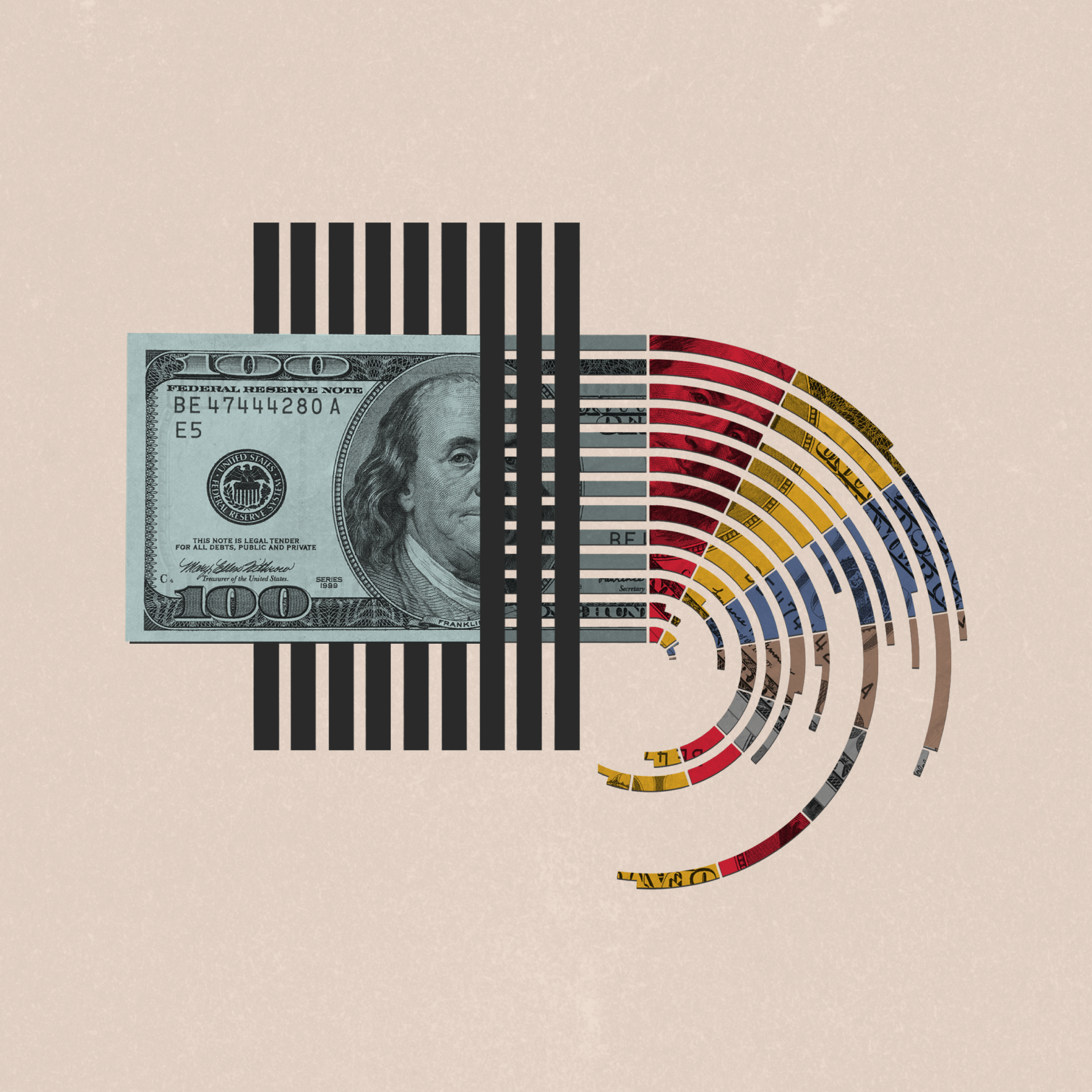Money & the World
Is Canada's Economy a Dud? A Semi-Official Investigation
We dove into the data to see how not great things truly are
Wealthsimple makes powerful financial tools to help you grow and manage your money. Learn more
What the heck is wrong with the Canadian economy!? That’s a question a lot of smart people have been asking — and fretting over — recently. Because clearly something is wrong. In May, the senior deputy governor of the Bank of Canada warned that our economic productivity has reached crisis levels: “I’m saying that it’s an emergency — it’s time to break the glass.” Globe and Mail columnist Andrew Coyne went further, cautioning that “growth has slowed to a crawl,” and adding gravely, “At some point, all this is going to shake Canadians’ sense of their place in the world.” And Shopify founder Tobias Lütke really seemed to have hit a nerve when he blamed Canada’s lack of first-rate companies on our country’s “go-for-bronze” mentality.
Are things as bad as the hand-wringers say? Is the Canadian economy really stuck in a ditch? We decided to dive into the data ourselves to see what’s going on. Here’s what we found:
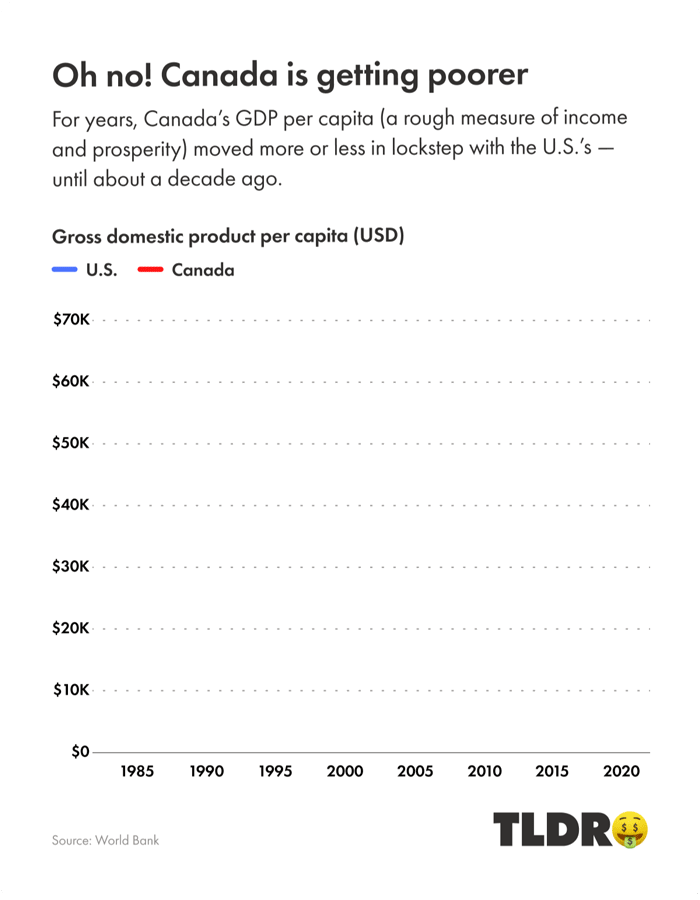
When op-ed writers discuss Canada’s grim economic outlook, they often point to the fact that our gross domestic product (GDP) per capita now lags the U.S.’s by almost 28%. Which is bad. Why? Because GDP per capita is a rough reflection of people’s income and living standards. And if Canada’s is slipping — well, that means we’re worse off compared to our neighbours. Why is this happening? Canada’s GDP per capita began to lag the U.S.’s in a serious way about a decade ago, when some big U.S. tech companies took off and the Canadian economy got rocked by a severe drop in crude oil prices.
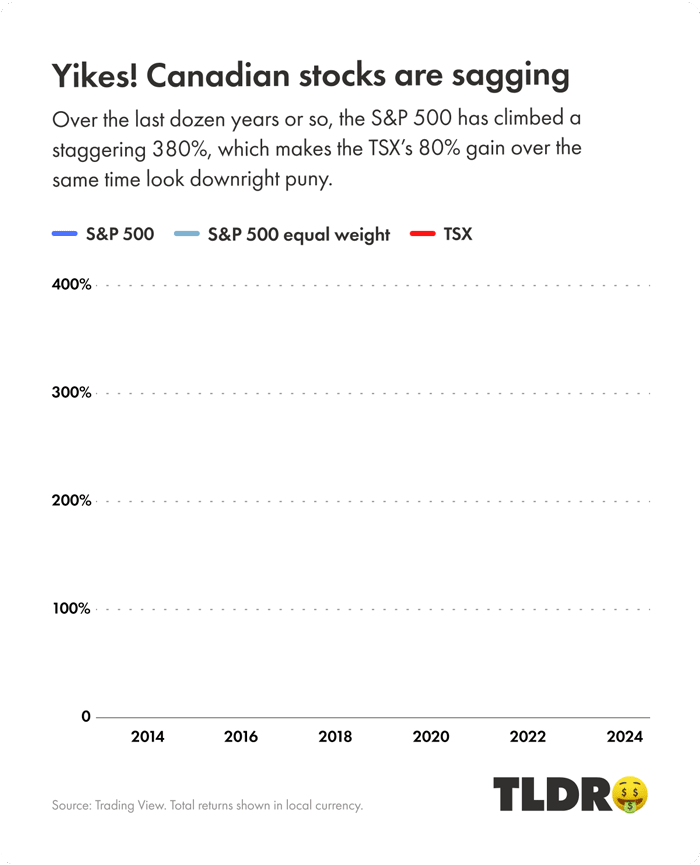
Another ominous sign: the TSX has way underperformed the S&P 500. A few huge tech companies have done much to lift U.S. markets. But the light blue line shows that even if the S&P 500 were equally weighted to dampen the effect of these giants, American stocks would still trounce the TSX. Point being: U.S. companies have, generally speaking, dominated Canadian ones.
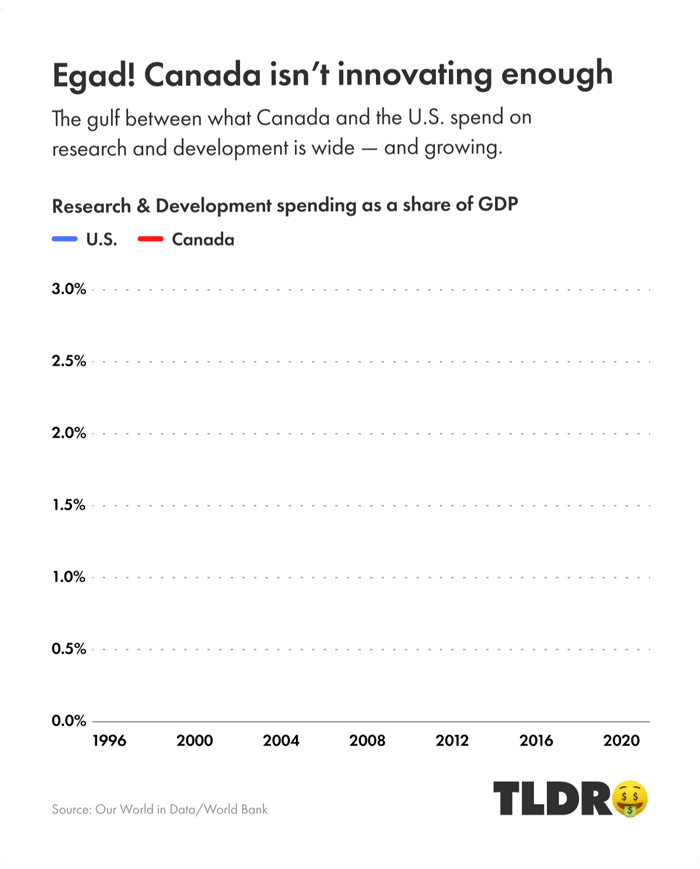
As if Canada wasn’t already lagging badly enough, we’re setting ourselves up for future meh results by investing significantly less in research and development (R&D) than the U.S. That means our companies, government laboratories, and research firms likely lack the resources to make breakthroughs that could generate wealth for Canada.
But wait! There’s a twist!
Those first three charts are not terribly encouraging. But careful readers may have noticed that in each example we compared Canada only to the U.S. If you add other countries to the mix, you get a different story.
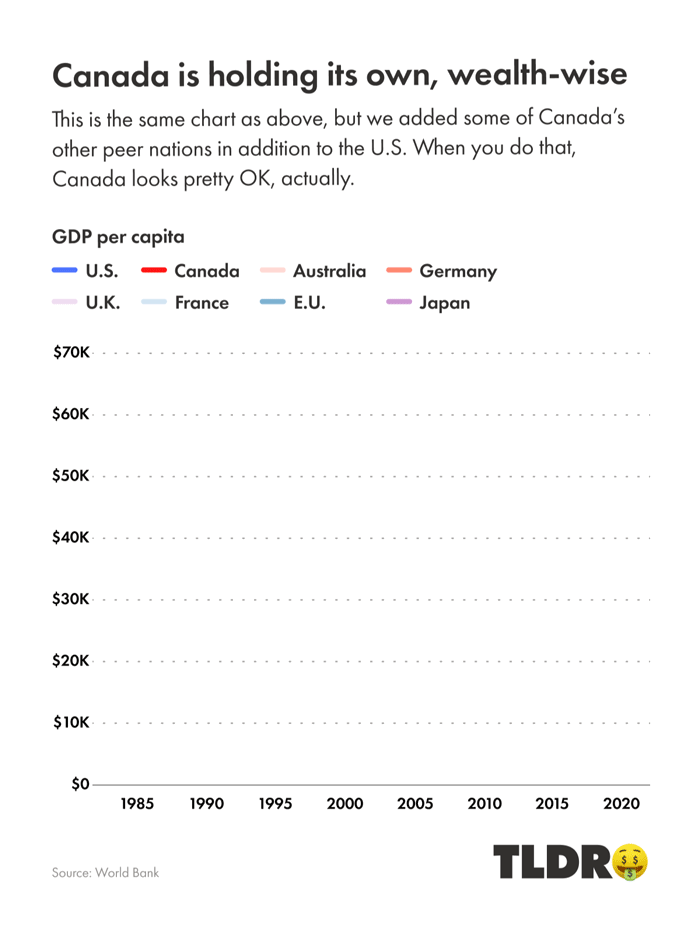
This chart turns the doom-and-gloom narrative on its head: Canada’s GDP per capita looks fine when you compare it to other rich nations’. The U.S. has just pulled way ahead of the pack.
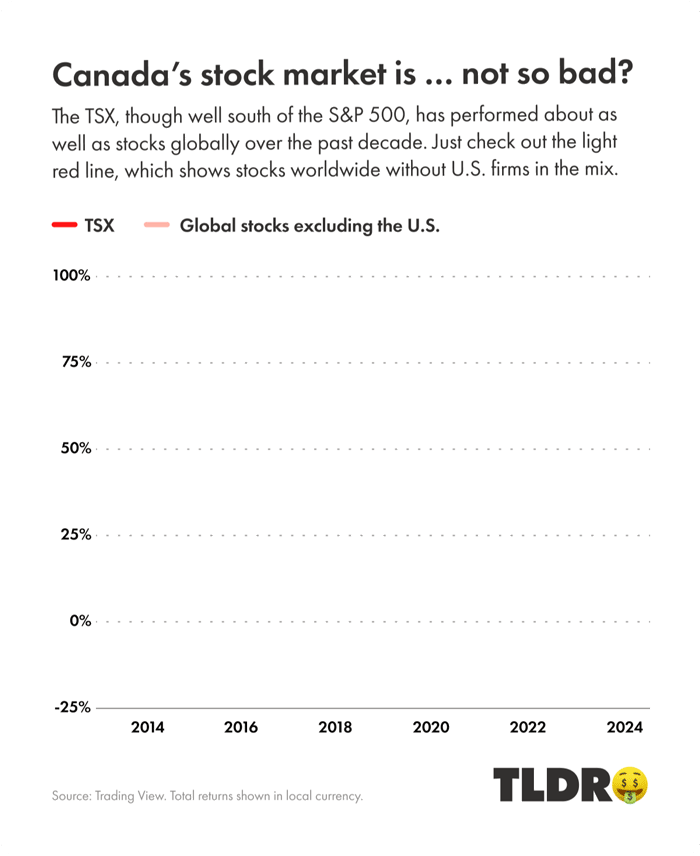
In this chart, we removed the S&P 500 and added a global stock index that excludes U.S. firms. As you can see, Canada’s primary stock market has kept pace with the rest of the world, meaning our companies aren’t huge losers; Canada is just a smaller country with fewer companies, and it doesn’t have a handful of tech superstars, like the U.S. does, to propel its markets above the rest.
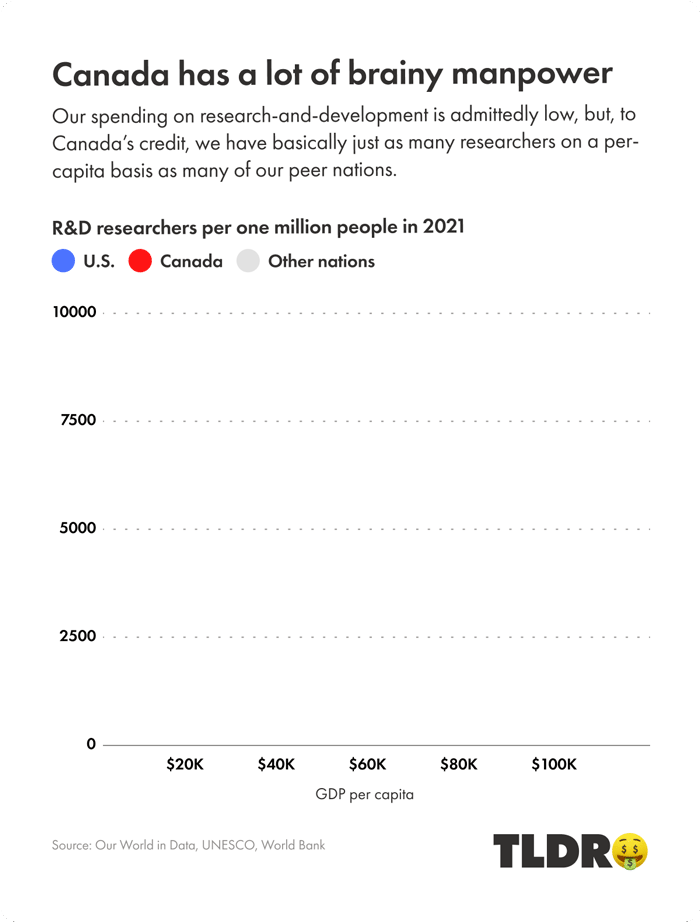
There’s no denying that Canada’s R&D spending falls well short of other countries’. But, as you can see here, we have a solid number of researchers relative to our population size; they’re just underfunded. Also, for what it’s worth, last year five U.S. tech giants together spent US$229 billion on R&D, which is roughly a third of the U.S. total, so it’s no wonder America’s R&D spending is high.
Why the U.S. is soaring past everyone else
The U.S.’s overperformance basically comes down to one thing: big tech. Five large companies are responsible for half of the S&P 500’s gains this year. Who cares? Well, so much foreign money has flowed into the States to invest in these tech giants that the U.S. dollar is extra swole as a result. And — this is wonky but important — a strong greenback partly explains why the U.S. has pulled away from its peers. Want proof? Just put GDP per capita into local currency, not USD, as we did above. When you do that, you’ll see that Canada has stayed in line with the U.S. In other words, our incomes have risen just as much as our neighbours’ in our respective countries.
There’s also other positive data you can cherry pick, like the fact that Canadians make a lot of tech products:
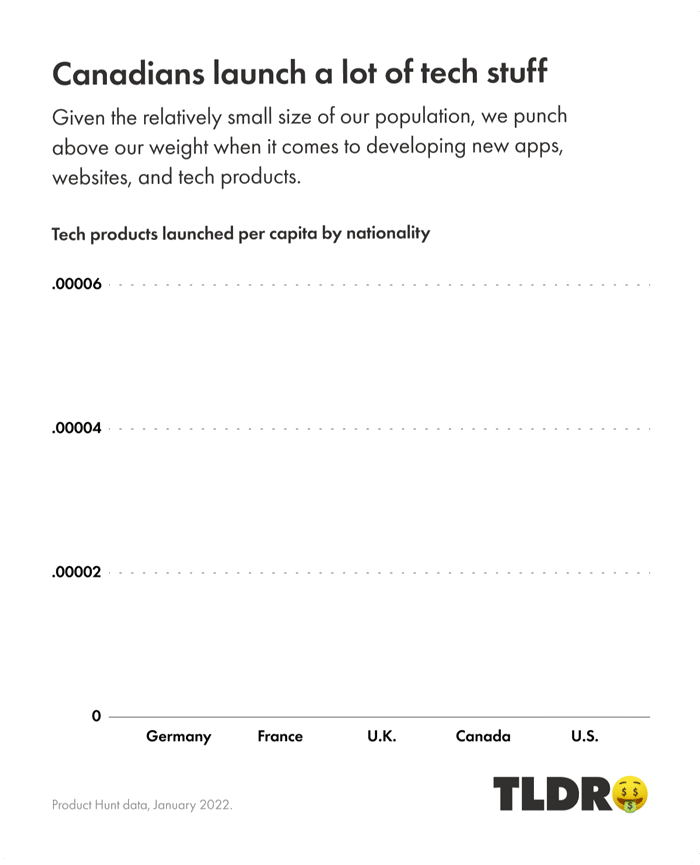
Canada has a choice to make
Our point is not that everything is sunshine and roses in Canada. We lack competition. Our stock market is overly weighted toward low-growth industries, like oil. And many Canadians are struggling to afford housing, food, and other essentials. But multiple things can be true at once. Even though the economy has problems, it is also, broadly speaking, in decent shape. Canada’s exports are near all-time highs, meaning folks abroad really want our stuff — one of the strongest signs that our economy isn’t petering out.
The main source of our angst seems to be that Canada has a very tall southern neighbour. As much as we like to poke fun at the Americans for their McMansions and absurd soda sizes, we often want to emulate them, at least economically. (You may notice that we seldom compare ourselves to France, the U.K., or the E.U.) That leaves us with a choice: we can either stop measuring ourselves against the States and just be content doing our own Canadian thing. Or we can learn from our neighbours and develop our own tech superstars. And that will no doubt take more R&D spending, more competition, and more investments in moonshot innovations — plus a lot of patience. (Nvidia, founded in 1993, didn’t become one of the S&P’s top-ten most-valuable companies until 2021.) The latter route won’t be easy sledding. But if we want to lead the world, then we’ll also need to distinguish ourselves from the rest of it somehow.
Jared Sullivan is an editor for Wealthsimple Magazine and author of the book "Valley So Low: One Lawyer's Fight for Justice in the Wake of America's Great Coal Catastrophe".
Sarah Rieger is a senior news writer for Wealthsimple Media, and co-host of the TLDR podcast. She was previously a reporter at CBC News and editor at HuffPost Canada. You can reach her at srieger@wealthsimple.com.
The content on this site is produced by Wealthsimple Media Inc. and is for informational purposes only. The content is not intended to be investment advice or any other kind of professional advice. Before taking any action based on this content you should consult a professional. We do not endorse any third parties referenced on this site. When you invest, your money is at risk and it is possible that you may lose some or all of your investment. Past performance is not a guarantee of future results. Historical returns, hypothetical returns, expected returns and images included in this content are for illustrative purposes only.






